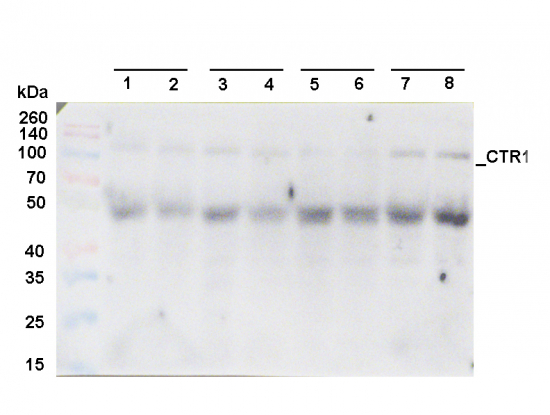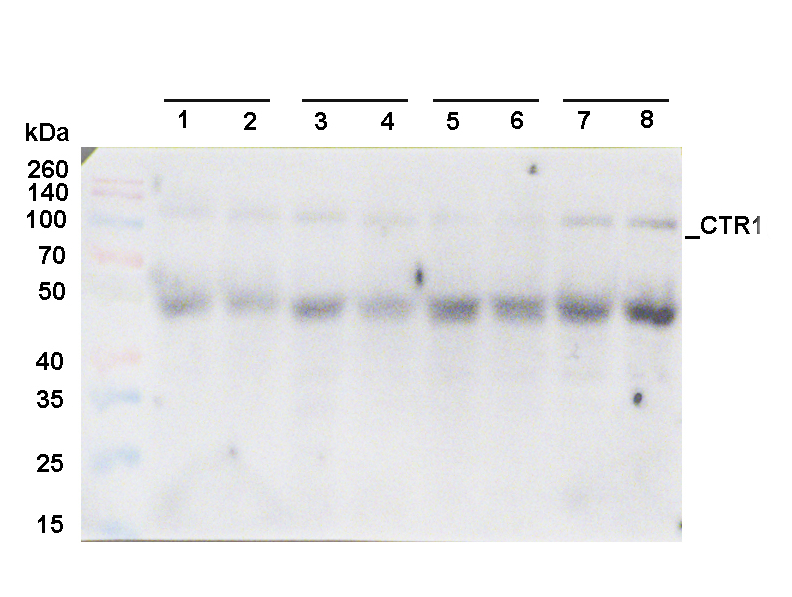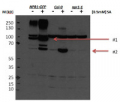1

Anti-CTR1 | Constitutive triple response 1
AS16 3988 | Clonality: Polyclonal | Host: Rabbit | Reactivity: Arabidopsis thaliana
- Product Info
-
Immunogen: KLH-conjugated peptide derived from Arabidopsis thaliana CTR1 protein sequence, UniProt: Q05609, TAIR: At5g03730 Host: Rabbit Clonality: Polyclonal Purity: Antigen affinity purified serum in PBS, pH 7.4 Format: Lyophilized Quantity: 50 µg Reconstitution: For reconstitution add 50 µl, of sterile water. Storage: Store lyophilized/reconstituted at -20°C; once reconstituted, make aliquots to avoid repeated freeze-thaw cycles. Please, remember to spin tubes briefly prior to opening them to avoid any losses that might occur from lyophilized material adhering to the cap or sides of the tubes. Tested applications: Western blot (WB) Expected | apparent MW: 71 kDa - Reactivity
-
Confirmed reactivity: Arabidopsis thaliana Not reactive in: Solanaceae sp. - Application Examples
-

Samples:
1 – 35 µg of Arabidopsis thaliana Col-0 (wild type) control whole leaf extract
2 – 35 µg of Arabidopsis thaliana Col-0 (wild type) treated with 12% PEG whole leaf extract
3 – 35 µg of Arabidopsis thaliana etr1-1 mutant control whole leaf extract
4 – 35 µg of Arabidopsis thaliana etr1-1 mutant treated with 12% PEG whole leaf extract
5 – 35 µg of Arabidopsis thaliana ctr1-1 mutant control whole leaf extract
6 – 35 µg of Arabidopsis thaliana ctr1-1 mutant treated with 12% PEG whole leaf extract
7 – 35 µg of Arabidopsis thaliana 35S:NMig1 (overexpressing At5g58740) control whole leaf extract
8 – 35 µg of Arabidopsis thaliana 5S:NMig1 (overexpressing At5g58740) treated with 12% PEG whole leaf extract
MW marker: SpectraTM Multicolor Broad Range from Thermo Scientific30 µg/well of total protein was extracted from frozen leaves with 100 mM Tris-HCl buffer pH 7.6 (containing 12.5% Glycerol, 20 mM β-mercapthoethanol, 2 mM PMSF) and denatured with Sample Buffer at 70°C for 5 min. The proteins were separated on 10 % SDS-PAGE and blotted 1.5 h to nitrocellulose membrane (pore size of 0.45 µm), using wet transfer. Blot was blocked with 5 % milk for 2h/RT with agitation. Blot was incubated in the primary antibody at a dilution of 1: 1 000 in TBS-T containing 2% milk ON/4°C with agitation. The antibody solution was decanted and the blot was rinsed briefly twice; then washed once for 15 min and 3 times for 5 min in TBS-T at RT with agitation. Blot was incubated in Agrisera matching secondary antibody (anti-rabbit IgG horse radish peroxidase conjugated, AS09 602) diluted to 1:25 000 in TBS-T for 1.5 h/RT with agitation. The blot was washed as above and developed for 5 min with Agrisera ECLBright (AS16 ECL-N-10). Exposure time was 10 seconds.
Courtesy of Dr.Irina Vaseva,Laboratory 'Regulation of Gene Expression', Institute of Plant Physiology and Genetics, Bulgarian Academy of Sciences, Sofia, Bulgaria
- Additional Information
-
Additional information (application): This antibody is recognizing YFP-tagged CTR1. - Background
-
Background: CTR1 (Constitutive triple response 1) is acting as a negative regulator in the ethylene response pathway. Alternative names: Protein CONSTITUTIVE TRIPLE RESPONSE1, Serine/threonine-protein kinase CTR1. - Protocols
-
Agrisera Western Blot protocol and video tutorials
Protocols to work with plant and algal protein extracts
Agrisera Educational Posters Collection
- Reviews:
-
This product doesn't have any reviews.



